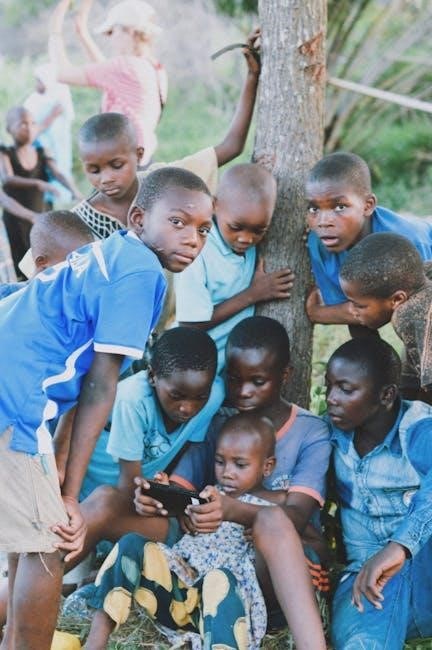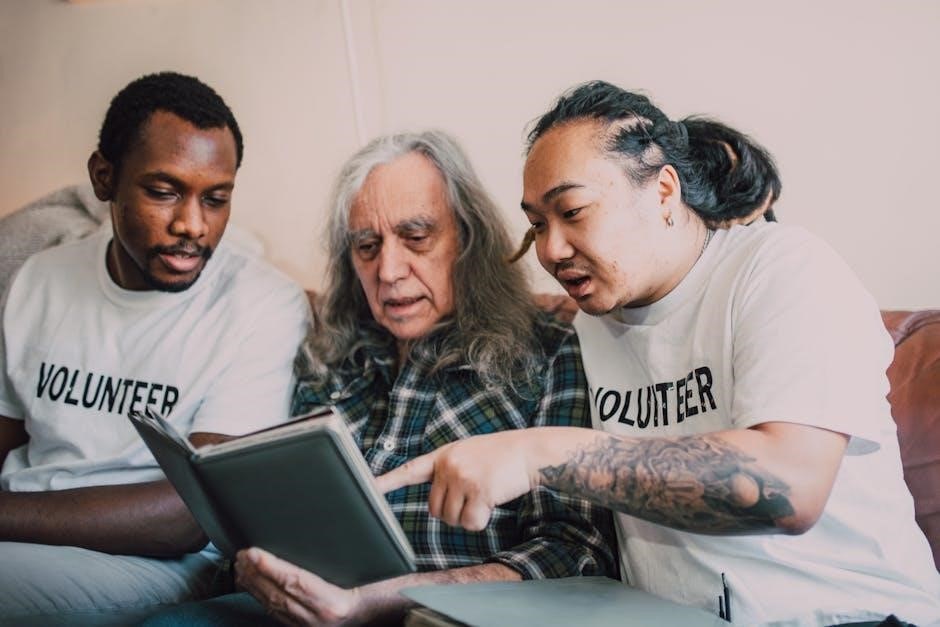Albert Bandura’s Social Learning Theory, developed in the 1960s, posits that individuals acquire behaviors by observing and imitating others, emphasizing cognition and social interaction in learning processes.

Overview of the Theory and Its Significance
Bandura’s Social Learning Theory revolutionized psychology by challenging traditional behavioral theories, emphasizing that learning occurs through observation, imitation, and modeling. It bridges behaviorism and cognitive psychology, highlighting the role of mental processes in acquiring behaviors. Bandura argued that people learn not only through direct reinforcement but also by observing others and understanding the consequences of their actions. This theory is significant as it explains how social interactions shape behavior, providing insights into education, health, and personal development. Its emphasis on self-efficacy and cognitive processes underscores the importance of belief in one’s abilities. The theory’s practical applications in classroom strategies, health interventions, and sustainable practices demonstrate its enduring relevance and influence across diverse fields.

Core Concepts of Social Learning Theory
Bandura’s theory emphasizes learning through observation, imitation, and modeling, with reinforcement and punishment shaping behavior. It integrates cognitive processes, self-efficacy, and environmental factors to explain human behavior.
Observational Learning and Imitation
Bandura’s Social Learning Theory highlights observational learning as a primary mechanism through which individuals acquire new behaviors. This process involves watching others, noting the outcomes of their actions, and replicating those behaviors. Imitation is central, as people often model their actions after observed models, especially when such behavior is reinforced. For instance, observing a peer receive praise for a task encourages imitation, while witnessing punishment deters it. Bandura’s famous Bobo doll experiments demonstrated that children imitate aggressive behaviors when modeled by adults, reinforcing the theory’s validity. Observational learning is not passive; it involves cognitive processes where individuals encode, store, and retrieve information to guide their actions. This concept underscores the profound influence of social interactions and environments on learning and behavior development.
The Role of Reinforcement and Punishment
In Bandura’s Social Learning Theory, reinforcement and punishment are crucial in shaping behavior. Reinforcement, such as praise or rewards, encourages individuals to repeat observed behaviors, while punishment discourages their replication. These mechanisms are not passive; they influence learning by altering an individual’s expectations and motivations. For example, witnessing a model receive a reward for a behavior increases the likelihood of imitation, whereas punishment reduces it. Bandura emphasized that reinforcement and punishment are most effective when they are consistent and contingent on the behavior. This aspect of the theory aligns with operant conditioning principles but integrates cognitive processes, as individuals mentally evaluate the outcomes of actions before imitating them. Thus, reinforcement and punishment are essential in guiding observational learning and determining which behaviors are adopted or avoided. They play a vital role in the social learning process, shaping behavior through consequences and cognitive appraisal.

Key Components of the Theory
Bandura’s Social Learning Theory includes self-efficacy, vicarious learning, and cognitive processes, emphasizing how individuals acquire behaviors through observation, reinforcement, and belief in their ability to succeed.
Self-Efficacy and Its Impact on Behavior

Self-efficacy, introduced by Bandura, refers to an individual’s belief in their capacity to execute behaviors and achieve desired outcomes. This concept is central to Social Learning Theory, as it influences motivation, persistence, and behavior. People with high self-efficacy are more likely to engage in tasks, persist through challenges, and achieve their goals. Bandura emphasized that self-efficacy is not an innate trait but is developed through experiences, such as mastery, social modeling, and persuasion. It plays a crucial role in shaping behavior across various domains, from education to health, by empowering individuals to take control of their actions and environments. Thus, self-efficacy is a powerful determinant of human behavior and achievement.
Vicarious Learning and Cognitive Processes
Vicarious learning, a key component of Bandura’s theory, occurs when individuals acquire knowledge or behaviors by observing others, even without direct reinforcement. This process involves cognitive functions such as attention, memory, and symbolic representation. Bandura emphasized that people mentally encode observed behaviors, which later guide their actions. Cognitive processes, like expectations and self-efficacy beliefs, further influence whether individuals will perform the learned behaviors. Observing models, especially those perceived as competent or prestigious, enhances vicarious learning. This mechanism underscores the social and cognitive dimensions of learning, highlighting how mental processes mediate the acquisition of behavior through observation. Thus, vicarious learning expands the scope of learning beyond direct experience, illustrating the complex interplay between observation, cognition, and behavior in Bandura’s framework.
Applications of Social Learning Theory
Bandura’s theory is widely applied in education, health, and sustainability, emphasizing observation and reinforcement to shape behaviors, fostering learning strategies and promoting positive health practices effectively.
Educational Implications and Classroom Strategies
Social Learning Theory has profound implications for education, emphasizing the role of observation, imitation, and reinforcement in classroom settings. Educators can use modeling techniques, where teachers demonstrate desired behaviors or problem-solving strategies, to guide student learning. Positive reinforcement, such as praise or rewards, can encourage students to repeat positive actions, fostering a supportive learning environment. Additionally, the theory highlights the importance of self-efficacy, where students’ belief in their ability to succeed influences their academic performance. Classroom strategies include incorporating group activities that promote vicarious learning, where students observe peers and learn from their experiences. By aligning instructional practices with Social Learning Theory, educators can create engaging and effective learning experiences that cater to diverse student needs. This approach not only enhances academic outcomes but also encourages the development of social skills and confidence.
Role in Health Behavior and Sustainable Practices
Social Learning Theory significantly influences health behavior and sustainable practices by emphasizing observational learning and self-efficacy. Individuals often adopt healthier habits by observing others, such as exercising or eating nutritiously, and are motivated by their belief in their ability to maintain these behaviors. In sustainability, people learn eco-friendly practices by observing others conserving resources or reducing waste. The theory suggests that positive reinforcement, like community recognition, can encourage sustained environmental actions. Conversely, witnessing negative outcomes from unsustainable practices can deter such behaviors. By understanding these dynamics, public health campaigns and environmental initiatives can design strategies that leverage modeling and reinforcement to promote healthier and more sustainable lifestyles, ultimately fostering collective well-being and environmental stewardship. This approach underscores the power of social influence in driving positive change at both individual and societal levels.
Bandura’s Legacy and Modern Relevance
Bandura’s Social Learning Theory remains foundational in psychology, influencing modern strategies in education, health, and sustainability through observation, self-efficacy, and technology integration globally.
Impact on Psychology and Education
Bandura’s Social Learning Theory revolutionized psychology by integrating cognitive processes into behavioral theories, emphasizing observation, imitation, and self-efficacy. In education, it transformed teaching strategies, encouraging the use of models, reinforcement, and interactive learning. Educators adopted these principles to create engaging classrooms, fostering student motivation and skill development. Bandura’s work also influenced teacher training, highlighting the importance of demonstrating behaviors and providing constructive feedback. His concepts, such as vicarious learning, reshaped understanding of how individuals acquire knowledge and skills. This theory’s practical applications continue to enhance educational practices, making it a cornerstone of modern pedagogical approaches.
Contemporary Applications and Research
Bandura’s Social Learning Theory remains highly relevant in modern psychology and education, with ongoing research expanding its applications. Recent studies explore its role in sustainable practices, health behavior, and educational strategies. For instance, the theory informs interventions promoting environmental conservation and public health initiatives. In education, digital tools like virtual models and interactive simulations are being used to enhance learning. Research also investigates how social media influences observational learning and behavior modeling. Additionally, the theory is applied in workplace training, emphasizing the importance of mentorship and vicarious learning. Modern adaptations integrate Bandura’s concepts with emerging technologies, such as AI-driven learning platforms. This evolution underscores the theory’s adaptability and continued influence in addressing contemporary challenges across various fields.

